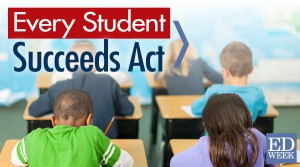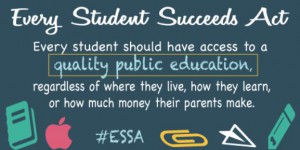 Southern Echo & The Delta Catalyst Roundtable submitted our comments and concerns to the Mississippi Department of Education on their Every Student Succeeds Act Draft Plan. We completed the MDE ESSA Online Public Comment Survey. We would like to thank all of the organizations and community people who helped to put all of our concerns and comments into a document to send to MDE. Below you can find our submission to MDE including links to supporting data and research.
Southern Echo & The Delta Catalyst Roundtable submitted our comments and concerns to the Mississippi Department of Education on their Every Student Succeeds Act Draft Plan. We completed the MDE ESSA Online Public Comment Survey. We would like to thank all of the organizations and community people who helped to put all of our concerns and comments into a document to send to MDE. Below you can find our submission to MDE including links to supporting data and research.
RE: MISSISSIPPI SUCCEEDS STATE PLAN PUBLIC COMMENT AND INPUT
Dear Dr. Nathan Oakley:
Southern Echo, Inc. and the Mississippi Delta Catalyst Roundtable are both privileged and excited to submit comments and recommendations on behalf of many communities throughout Mississippi during the public comment period on the Mississippi Consolidated State Plan. As we have developed our public comments to help strengthen the Mississippi Consolidated State Plan for ESSA Implementation, we wanted to highlight several very important concepts.
- Our public comments are a critique not a criticism. As a “Critical Friend” of the Mississippi Department of Education (MDE), we value the authenticity of the relationship that we share to be able to speak openly with you in a transparent manner about how to improve the MS ESSA plan that will connect Mississippi’s strategic goals to the strategies and activities of the Mississippi Department of Education and local school districts to prepare students for college and careers.
- This submission is a collection of community input from around the state of Mississippiwith an emphasis on the areas where we work in Mississippi.
a. We have conducted ESSA trainings and workshops in many counties in Mississippi to ensure parental and community engagement and to support improving educational outcomes in our communities through the appropriate development and implementation of the MS ESSA Plan. Please see the “Map on ESSA Work” that shows our level of engagement in helping to educate and inform the grassroots communities on ESSA
b. We have worked on many levels to raise awareness about the new law, rules, andregulations to help “Every Student Succeed in the State of Mississippi”. We have been on radio, TV, webinars, in news print, and we have been on national and regional panels to raise awareness about ESSA and the implementation of ESSA in Mississippi. - Our community submission is in direct alignment to the spirit of the Elementary and Secondary Education Act (ESEA) that was signed into law in 1965 by President Lyndon Baines Johnson, who believed that “full educational opportunity” should be “our first national goal.” From its inception, ESEA was a civil rights law. ESEA offered new grants to districts serving low-income students, federal grants for textbooks and library books, funding for special education centers, and scholarships for low-income college students. Additionally, the law provided federal grants to state educational agencies to improve the quality of elementary and secondary education {ed.gov}. Our community public comments have a major focus on poverty in the public school districts where the most vulnerable students attend public schools in Mississippi. Please see “Report Explaining Disparity in Student Performance”. The data in this report uplifts the pillars and concepts of the ESEA of 1965 by providing assistance to school districts that are impacted by low wealth in the community and student poverty compounded by race,class, critical teacher shortage areas, and other socioeconomic factors.
- We believe that this Mississippi Consolidated State Plan (Mississippi ESSA Plan) is a shared and joint plan between the State of Mississippi, the Mississippi Department of Education, all 144 public school districts, the parents, students, and other community stakeholders in all 82 counties. All of us are responsible for making sure that this education law is fully and properly implemented so that it will serve all children in a lawful, fair, and just manner.
As you are aware, Southern Echo, Inc., the Mississippi Delta Catalyst Roundtable, and our community education stakeholders have been very actively engaged in trying to be at all of the Mississippi Department of Education (MDE) meetings, workshops, forums, and public meetings concerning the development and implementation of the Mississippi ESSA Plan that is called the “Mississippi Consolidated State Plan”. We are thankful that the community has been able to have some level of participation in the Mississippi ESSA Plan development. As community people, we would certainly have welcomed the opportunity to serve on the Mississippi ESSA Advisory Committee; however, we were able to engage and participate on the MDE Working Group Committees, the MDE listening tours, and at the Mississippi State Board of Education meetings so that we could help shape the development of the Mississippi ESSA Plan. We believe that we were instrumental in helping to make the MS ESSA Plan a more community engaged and educational process for our community people.
As a response to the three (3) public meetings across the state that the Mississippi Department of Education (MDE) conducted to share the information on the Mississippi Consolidated State Plan, we were encouraged to complete the online survey, Mississippi Succeeds State Plan Feedback Survey. As we completed the online survey, Page 6 of 6 allowed additional comments for consideration. Below are the substantive items that we would like to have added to the Mississippi Consolidated State Plan to help improve academics, students, and schools’ outcomes. Before we present our public comments, we wanted to share that MDE must do a better job of informing the community about ESSA-Mississippi Succeeds Plan. Example: Mississippi has 82 Counties and MDE only held public meetings in three (3) counties. MDE held listening tours in nine (9) out of the 144 school districts. Many communities across the state did not know about the MDE ESSA process. The community ESSA work that we reference in this public comment letter, unfolded because Southern Echo, Members of the Mississippi Delta Catalyst Roundtable, and other education stakeholders were engaged and informed other communities around the State about the importance of ESSA development and implementation. Southern Echo, Inc. and the Mississippi Delta Catalyst Roundtable also held a statewide ESSA Conference at Jackson State University on February 25, 2017 that engaged and trained parents, students, educators, legislators, community, and other education stakeholders on ESSA.
We also wanted to uplift that having meaningful public comments and meaningful public engagement could have been better for this MDE MS ESSA process. Having a public meeting where the public cannot participate is not representative of a fair and just democratic process or model. We were “shocked” when we could not offer verbal or written comments at any of the three (3) MDE public meetings held in Hattiesburg, Jackson, and Oxford. Also, MDE ESSA meetings were not conducted in communities and school districts that have the greatest needs and that would be impacted the most by the development and implementation of ESSA. We believe that MDE should have certainly conducted several MDE ESSA meetings/trainings/workshops inside of the school districts where the highest achievement and equity gaps exist, inside of the focus districts, inside of districts where the lower 25% quartile of students are failing, and in districts rated a “D” or “F”. This is important because the MDE ESSA process left out the people who needed to be at the table and actively engaged to help improve educational outcomes. Often times, the people most impacted are left out of decision making processes. Please see the map “MS Accountability Grade Ranking and Graduation Rate 2015-2016” that illustrates the districts and counties who are in the most need of these ESSA education improvement services.

- Most of the questions presented enough information for you to somewhat agree, therefore it was as if you were forced to agree unless you just totally disagreed. Here are several concrete examples.
* Even though, the plan talks about early childhood development, there is no guarantee of implementation because the state of Mississippi does not have a state funded early childhood program.
* Further, the state plan is more visionary than actionable because it does not describe how the plan will be achieved and or implemented in every school or district throughout the state.
* The plan does not describe how every school and school district will implement theplan especially since resources vary by schools and districts.
* Also, the plan doesn’t speak to how targeted (TSI) and comprehensive (CSI) schools and school districts will achieve success around students and schools’ outcomes with limited resources, limited to no teachers in classrooms, extreme poverty, and the lack of community and economic development, especially in rural communities throughout the state. - This online survey does not make considerations for parents who do not have computer experience to properly complete the survey.
- This online survey does not take into consideration that many parents in our communities do not have access to computers or the internet to complete the survey.
For these reasons, some community people who completed this online survey had to check mark “Disagree” because they believed they did not have a real accurate choice. Our responses are intended to strengthen the Mississippi State ESSA Plan. Again, this is a critique not a criticism of the Mississippi State ESSA Plan, but recommendations to consider and strengthen going forward.
Now we would like to share more of our thoughtful community public input for the Mississippi Consolidated State (ESSA) Plan. We shaped our public input by collecting community input and using your “Mississippi Succeeds Executive Summary and State Plan for Implementation of the Every Student Succeeds Act”. We know that several of our items might seem redundant because they appear in several places inside of the draft MS ESSA Plan.
Concern #2: Positive School Climate needs to be in the State ESSA Plan.
One of the major community engagement and education process that we would like to see added to the Mississippi Consolidated State (ESSA) Plan is the inclusion of POSITIVE INCLUSIVE SCHOOL CLIMATE. However, we have to be clear about what positive and inclusive school climate means to us — it means implementing discipline alternatives, like restorative practices, instead of practices that push children out of school. The inclusion of positive school climate and safety as an indicator of school quality in the MS ESSA plan will give every student a meaningful chance to succeed in the classroom by requiring buy ambien online pharmacy school districts to create positive school climates that allow students to remain in school and learning. We have shared this detailed information with you in the past and we have seen several elements of positive school climate in some parts of the MS ESSA Plan but the plan still requires more. We are thankful for the pieces that are in the plan; however, the major indicator of school quality is required for our students to be successful in the classrooms. School disciplinary practices impact school quality and students’ educational success. There is strong research showing that positive school climates will increase several aspects of student success, including school attendance, academic achievement, and graduation rates. Because of this, the Mississippi Department of Education should measure school climate by using school discipline data (i.e. in-and out-of-school suspensions, expulsions, referrals to law enforcement, and school-based arrests) and student and parent school climate surveys. The Department should also develop a definition for positive school climate in consultation with parents and other stakeholders and include this definition in its state plan. For example, the national Dignity in Schools Campaign’s Model Code on Education and Dignity urges states and districts to create a climate where “students feel socially emotionally and physically safe, … there is mutual respect between teachers, students, parents or guardians, and … students’ self-expression and self-esteem are supported.” Please view “Positive School Climate Fact Sheet by DSC” which clearly defines and illustrates how positive school climate can help to improve education outcomes for the Mississippi State ESSA Plan.
Concern #3: Addressing Chronic Absenteeism (Page 3 Infographic)
The MS ESSA Plan needs to address the relationship that exists between absent students and the badly needed funding for underserved students especially the ones in the African-American Communities and in the Mississippi Delta. Per your data, the Student Average Daily Membership (486,471) minus the Student Average Daily Attendance (451,466) is 35,005 students. Multiply 35,005 by the Average Expenditure Per Pupil of $9,704 is $339,688,520 Annually!!!
How do we uplift standardized testing to address the 70% failure rate on these standardized tests? 30% of the students are performing. What are the specific remedies in the MS ESSA Plan for the 70% that is failing on the tests? How do we look at African-American performance on standardized tests to help increase academic performance? MDE needs to place the resources in the areas where they are most needed. MDE needs to ensure a plan to get the desired results that will increase the success rate above 70%.
Concern #5: NAEP should break the testing down into the sub-groups (Page 8 of Executive Summary)
Breaking the testing results out will help the local school districts and community to make better strategic assessments for education resources. The Sub-Groups break outs are below:
- Race (African-Americans)
- Gender
- English Language Learners
- Pre-K (schools that have Pre-K programs or not)
Concern #6: Increase College and Career Readiness with ACT in all schools. (Page 9 of Executive Summary)
- ACT Classes and supports should be in ALL 144 School Districts.
a. ACT Prep Classes (Practice Classes) are in schools that are performing well on ACT (i.e., Madison County, Desoto County, etc.) - Also (in addition to public school funding), an allotment of funds should be made to local Non-Profit Community Based Organizations working on education issues to help provide ACT prep classes for students.
Concern #7: We can increase College Enrollment and Remediation (Page 11)
- The Advance Placement (AP) assessment should be free to the students to help increase college enrollment. Approximately $90 per test currently.
- AP courses do not count towards the student’s college hours unless the student passes the AP test. {You can pass the class and not pass the AP test.}
a. It is easier to get your college hours in “Dual Enrollment Courses” than it is to do the AP process
Concern #8: Increase Funding for TSI-Targeted Support & Improvement and CSI- Comprehensive Support & Improvement funds {Previously known as the Focus and Priority Schools/Districts} (Page 12)
- Funding should not be a competitive process but a “Formula Based Process” for the school districts in the MS ESSA plan that need the funding help to improve academics, students, and schools’ outcomes.
- We need to work to ensure the full funding of the Mississippi Adequate Education Program (MAEP). We will also uplift that local school districts must also create funding for their local schools and this is a very serious problem to overcome in the focus and priority school district areas. Please see the map on “Value of a Single Mill” that showshow the local school district creates education funding and how the areas with the highest achievement gaps have very few local resources to create education funding. Please see the “Chart on Millage from 2015-2016” that shows the latest Millage Rates for Mississippi.
- MDE has “Limited Resources and Capacity” to do this effectively and efficiently without appropriate funding from the Mississippi Legislature. In addition to fully funding MAEP, the Mississippi Legislature should commit additional funding and resource for students at risk to ensure the proper implementation of the MS ESSA Plan.
- Ensure accountability for the use of the TSI and CSI funds to increase education outcomes.
- MDE should use qualified CBO-Community Based Organizations / Non-Profit Organizations that are doing education work to help in the TSI and CSI training processes to help provide the professional development in the local school district.
- MDE needs to increase funding from the philanthropy world to help fund the current education equity gaps with an emphasis on the Mississippi Delta, Focus Districts, and our most vulnerable communities.
Concern #9: All students Proficient and Showing Growth in All Assessed Areas (Page 14)
Fidelity can be addressed in several real ways:
- Make Pre-K and Kindergarten mandatory and fully funded by the state for all students so that students will be better prepared for the 1st grade.
- Professional Development for all Pre-K and Kindergarten teachers to help address all of the Pre-K and Kindergarten students’ needs.
- Create and encourage models for early childhood collaborations between Head Start Providers (ICS type providers), private childcare providers, home care providers, and Public Schools. MDE needs to go further than the Early Learning (Childhood)Collaborative grant process.
Concern #10: Recommendation to Address the Whole Child for a Quality Education
- MDE should assess the James Comer’s School Development Program or Comer Process. The nine-element process fosters positive school and classroom climate and creates optimal conditions for teaching and learning, and emphasizes the alignment of curriculum, instruction, and assessment. Please see the”Fact Sheet Comer Process” that describes the principles of the school operating system that helps to improve education and community outcomes for students.
- Everyone in the School must have child and human development training.
- We recommend the implementation of Restorative Justice Practices to increase educational outcomes through positive discipline approaches.
- We must have qualified and certified counselors and social workers inside of our schools.
- All schools should have a functioning P-16 Community Engagement Council regardless of their accountability rating.
- We should utilize Peer-to-Peer mediation and conflict resolution models inside of ourschools.
- We recommend that Peer-to-Peer School Districts should support each other with bestpractices to help improve student outcomes.
Concern #11: MDE ESSA Plan must have Effective Teachers and Leaders (Page 18)
- Everyone in the School must have child and human development training.
- How does MDE define effective Leaders and Teachers?
- MDE should provide special teacher certifications for teacher assistants to be certified for teachers and not require additional schooling for these new teachers in grades K-3.
- MDE should have teacher assistants for grades 4th – 8th to help increase academicperformance.
- We need to address the State Legislative Requirements for teachers. The first requirement should be the creation of a “Regional Pay Scale for Teachers” and fund the pay scale to help address the critical teacher shortage in the state of Mississippi.
- As we raise the academic standards, we must increase the preparation process in theclassroom to ensure that the students and teachers can meet the standards.
- The MS ESSA Plan needs to address the Chronic Absenteeism of Teachers in a proactive manner preferably through “Positive School Climate”. This is a major problem in the MS Delta Schools.
- Take the decisions about teacher requirements away from the legislature and put it back into the hands of MDE who are experts on education and educators’ requirements.
- MDE should put funds into supporting teacher creation programs at HBCUs to help teacher shortage areas.
- Do not put certain weight and determination on more standardized testing with emphasis on the Praxis I & II.
- MDE needs to develop a program to help nurture and develop substitute teachers to help grow our own local teachers to address teacher shortage areas. Please see “Critical Teacher Shortage Areas Map” that shows the areas where there continues to be major teacher shortages in districts where the greatest achievement gaps are located.
- When using foreign teachers, a mechanism needs to be developed to address language barriers that prevent students from understanding the foreign teachers. {Used to satisfy the requirement for a certified teacher in the classroom.} This process must require that teachers are compliant with the English Language Learners MDE requirements.
- We want highly qualified, certified, and caring teachers in their specialty areas in every classroom. Please see the “Map of Teacher Student Data by Race” that shows the data on teachers and students in all of the school districts.
- We recommend that MDE do away with the Conservatorship process.
Concern #12: Improving and Reporting Changes (page 19):
- We must properly fund the Comprehensive and Targeted Schools and School Districts. a. The MDE MS ESSA plan does not have enough money to support Comprehensive(Focus) and Targeted (Priority) Districts.
- Elements of the Current Education Plan is not aligned with MDE’s strategic Goal #6 where every school is rated academically a “C” or higher.
- The Repeal of Transformation District Laws and Policies should occur.
- Remove the Achievement District Laws and Policies.
a. Why do we need an Achievement School District if the Vision for Education is tomake sure that every school district is rated academically a “C” or higher according to MDE’s Strategic Goal #6?
b. It is our belief that the Achievement School Districts are a back door to statetakeover and Charter Schools.
c. The MS ESSA Plan needs to produce a time line for moving all Districts to a “C” or better so that community can understand the action plan for what is directly happening in each school district. - The MS ESSA Plan should require all school districts to establish P-16 Community Engagement Councils to help more parents, students, and other community stakeholders to be actively engaged in the education process. The P-16 Community Engagement Council can be a good vehicle to use for MS ESSA implementation that can help Mississippi to be in compliance with federal education regulations that require community engagement.
As we close this reply to your request for effective public comments for the Mississippi Consolidated State Plan, we hope that our concerns are incorporated into the MS State ESSA Plan. We would like to repeat that our comments are being submitted to strengthen the State ESSA Plan and to help MDE provide leadership through the development of policy and accountability systems so that all students are prepared to compete in the global economy. If you have any concerns or questions about this submission, please email or call Southern Echo, Inc. for more information. We value this opportunity to engage with you as we move towards ensuring that Mississippi’s public education system delivers a first-rate quality education to all students and families in the State.
Educationally Yours,
Rachel Mayes
Executive Director,
Southern Echo, Inc.
&
MS Delta Catalyst Roundtable Members
*Action Communication and Education Reform
*Citizens for a Better Greenville
*Citizens for Educational Awareness
*Fannie Lou Hamer Center for Change
*Nollie Jenkins Family Center, Inc.
*Rural families United for Empowerment
*Southern Echo, Inc.
*Sunflower County Parents and Students United
*Tunica Teens In Action, Inc.
*Youth Innovative Movement Solutions

